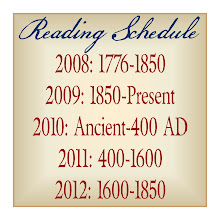If you chose the Grapes of Wrath, please leave your comments to this post.
Monday, September 7, 2009
Grapes ...
I wish I had a cleaver title for this post, but to be honest, I didn't get both the books read like I had wanted too. However, I know that this book is supposed to take place around the same time as the Great Depression, and I would love to hear what similarities and differences were found to our times.
Subscribe to:
Post Comments (Atom)





3 comments:
I’ve been meaning to read this for a long time. Now that I’ve read it, though, I doubt I’ll go back to read again any time soon, if ever. The story is extremely well done, and flows extremely well. The language and tone of the book, however, are a bit too coarse for my taste. Steinbeck did a little too good of a job keeping up with the vulgarity and innuendo in the travelers’ lives.
Language aside, the story is extremely compelling. It made me think quite a bit about the way we treat other people and what we’re willing to do to others in order to get ahead. (Or, in the book, what we're willing to do to keep from falling behind.)
One of the most amazing images for me in the book was the description of people agonizing about not having enough food for their children while, at the same time, watching the small farmers burning their produce. It would have been horrible. [The small farmers were forced to destroy their produce because major corporate farms and banks who had a financial interest in their own farms could drive down the buying price of the food to unprofitable levels. The farmers were then faced with one of two options - give away their produce to the thousands of Oakies who had come to California - or be paid by the large corporations to destroy their crops, because, "people won't by an orange if they can drive down the road and get one for free." Unfortunately, since the small farmers also had families and mortgages to worry about, they usually had to choose the money.]
Reading about things like that gave me a new appreciation for how dramatically devastating the depression really was - and how much worse it really was than what we're seeing today. It really put people's worries about another great depression into focus. We definitely haven't gotten to that point yet.
Reading also made me extremely curious to find out about my grandparents and their time in California during the depression. I ended up chatting with my Dad about it a few days ago (my grandparents aren't around any more) and it was extremely interesting. Like the Joads, my grandpa drove across the country (from North Carolina to L.A.) in an old beat-up car that nearly didn't make it. Like the Joads, he was also quickly confronted with the unpleasant reality that there really wasn't much more work in California than in many other parts of the country. He was able to make it work in the end - and my Dad grew up in L.A., but it certainly wasn't easy.
Of all the things that stayed with me from the book, one of the biggest was an impression on just how vulnerable we make ourselves when we go into debt. It’s amazing to think how willing we are to tie ourselves and our future to a contract that is controlled by others. I’ve never liked debt, but I like it even less now. Reading about how easily the farmers were kicked off their land and controlled by larger entities made me want little more than to heap up our own savings, pay down our mortgage and be able to support myself, job or not, for as long as possible.
It’s amazing to think about just how fortunate we all really are. I’m glad to have a family, a home for them to live in, and a job to keep it all together.
Mr. Mordecai,
Thank you for this post. I read Grapes of Wrath many years ago and didn't care to reread it, though I don't have much residual memory of the story, just a feeling of despair.
I appreciate your comments on the story and, for now, how fortunate we are by comparison. I also appreciate your timely reminder about getting out/staying out of debt.
I too want to thank you for your comments. You did a lot of things for me. You warned me of the vulgarity. You made me realize that there are good parts and I need to keep it on my "read eventually list", but you also made me feel like I read the right book this month. For some reason I think I needed the lessons in To Kill a Mockingbird.
I think it is wonderful that you could use this as an opportunity to learn more about your family too. What a great experience. The little I know about my family during those times are cherished memories to me.
and I too agree that we need the reminders about debt and that, unfortunately, things can get much worse than they are. We need to be thankful for what we have.
Post a Comment